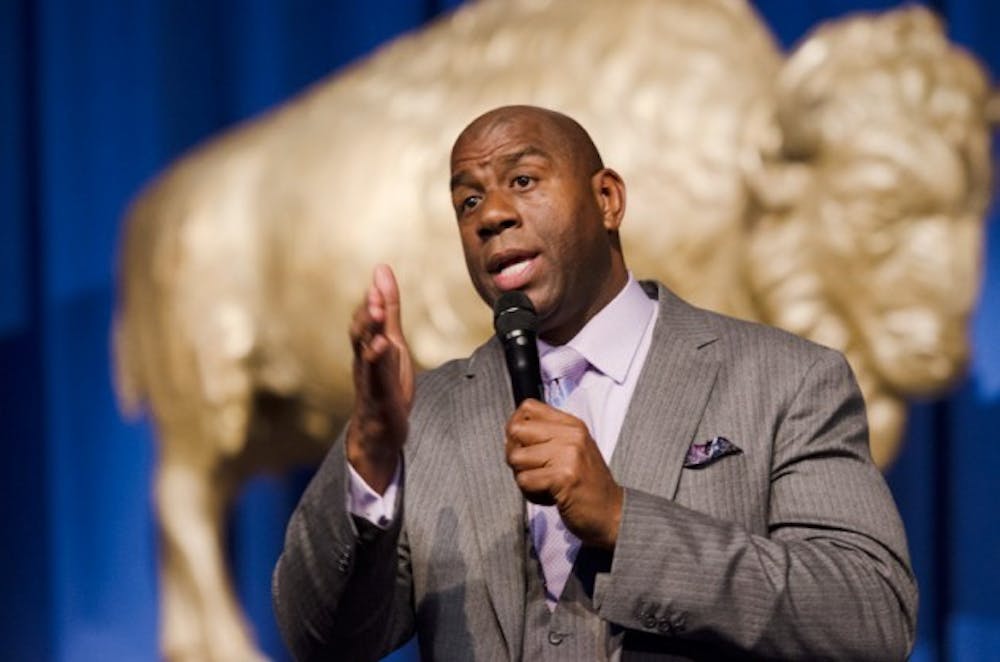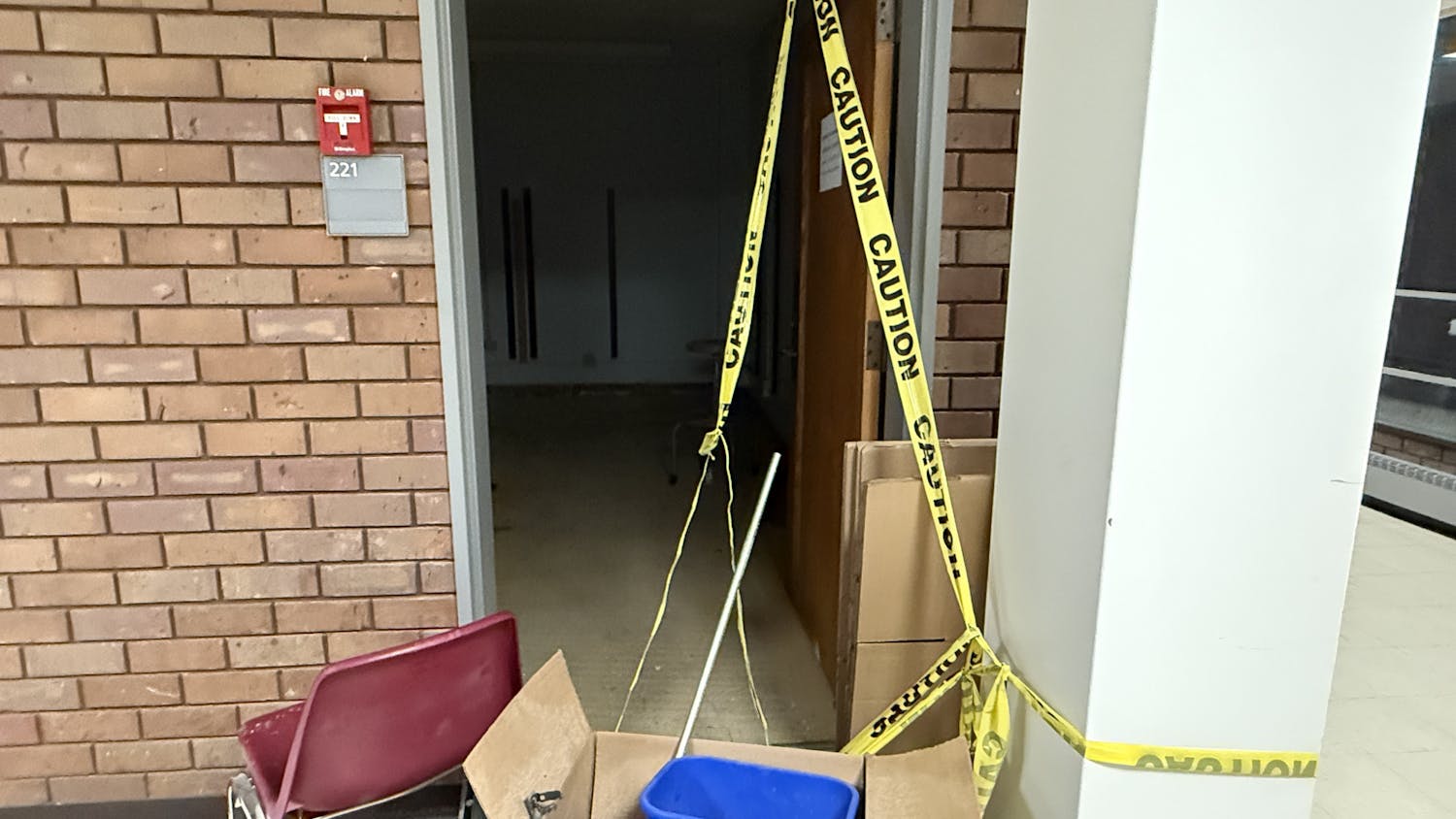When Earvin ‘Magic’ Johnson was in high school, he’d sneak into the CEO office of the building he cleaned on the weekends. He pretended he was the boss.
He imagined his secretary “Ishia” would bring him his coffee, doughnuts and newspaper every morning.
For three hours, Johnson dreamed. Now, he’s the CEO.
He said he’s spent his whole life “over delivering” to be successful and Thursday in Alumni Arena, he wanted all students present to agree to do the same.
Growing up poor in a three-bedroom house with six sisters and three brothers in Eastern Michigan, Johnson knew he had to “over deliver” in life in order to succeed.
And Johnson – with his larger-than-life personality and stature – had every student in Alumni Arena repeating the word, “over deliver,” back to him.
“This is really important,” Johnson told the crowd as they stood up from their seats. “You need to over deliver to your parents, your siblings, in the classroom. It’s not enough to just deliver today. You have to over deliver.”
Johnson paced around the floor of Alumni Arena and addressed – sometimes directly one-on-one – the thousands of people in attendance Thursday night, as the 39th annual Martin Luther King Jr. Commemoration Keynote Speaker as a part of UB’s Distinguished Speaker Series. Johnson was not available for interview. He focused his speech around what he considered to be the two biggest challenges for minorities: education and economic development.
Johnson, 55, played all 13 of his NBA seasons with the Los Angeles Lakers, winning five NBA championships – including three NBA Finals MVP awards – throughout the 1980s.
But Johnson only mentioned his Hall of Fame career on the hardwood a few times Thursday night – not what one would normally expect when listening to a speech by a retired athlete regarded as one of the best to ever play his sport.
With Johnson, it’s not correct to simply label him as an NBA Hall of Famer. His post-retirement job titles read almost as long as his playing career accomplishments: entrepreneur, philanthropist, activist, analyst, MLB owner and after Thursday night, a Distinguished Speaker.
He’s one of the few superstar athletes to be known as well as, if not better, for his accomplishments post-retirement than what he did in his illustrious playing career. He spoke more about educating inner city kids and executing business contracts than dishing out assists or winning NBA titles.
Johnson is also known for retiring from the sport in 1991 after discovering he was HIV positive, but he only mentioned the virus near the end of a Q&A session, saying God has blessed him to still be alive 23 years after his diagnosis. He became a huge voice and advocate during the AIDS epidemic of the ’80s
“The main thing I’m proud of is not what I’ve done in basketball, it’s my work in urban America,” Johnson said.
Johnson entered the stage in Alumni Arena to a roaring round of applause, but instantly jumped off the stage – admitting he was “too old” to be doing so in the process.
“I like to roam,” Johnson said. “I’m not a guy who likes to stay on stage.”
Johnson delivered his speech weaving in and around the ground floor seats of Alumni Arena, often picking out an individual attendee to address directly, from a 13-year-old basketball fan to Mayor Byron Brown and his wife.
He’d ask them for their first name and pose for a picture, flashing his signature smile, before telling them a story from his business or playing career. He addressed them by their first name and kept eye contact with only them, almost as if he was oblivious to the thousands of other people or as if everyone else in attendance was eavesdropping on a private conversation.
Johnson picked out two young boys, Tyler and Cam. He told them how he grew up poor. Johnson’s family couldn’t afford to buy him Julius Erving sneakers – what he calls the equivalent of Jordan sneakers today.
Johnson had to wear $1.99 sneakers.
“But for the $1.99 sneakers I wore, that didn’t stop me from being the best basketball player on the court,” Johnson told the boys. “All of the other kids had Dr. J’s on. I had the $1.99 shoes on. But here I come. Guess who won?”
One of the boys promptly answered Johnson with, “You.”
As the Martin Luther King Jr. Commemorative Speaker, Johnson spent much of the night discussing King’s vision for the United States and the struggles of the black community. Johnson said he wouldn’t have played in the NBA if not for King’s civil rights work in the 1960s.
He said it’s imperative black people get back to owning their own businesses, and education is the key for black people in poverty to improve their economic situation.
“The way they’re going to get out is through education, education and more education,” Johnson said.
Johnson said he wasn’t “one of those athletes who didn’t go to class,” while at Michigan State and wanted to invest his money into urban America.
He said he researched that black people were the No.1 group going to movies, but there were no theaters in his community. He made a deal with Sony to open theaters in the inner city.
Johnson told the story of when he knocked the door of Starbucks CEO Howard Schultz and said, “Black folks drink coffee, too.” He said people thought a Starbucks would never work in urban America, so Johnson had to first show Schultz the theater he opened in the urban city before approving a deal.
He said King preached about blacks being “first class,” so Johnson made sure his theater was run “first class” and had the best customer service.
“I became the first person and only person outside of Starbucks to own Starbucks,” Johnson said. “Anytime a man of color can build 125 Starbucks and be the only one to do that, that’s what Dr. King was talking about.”
Johnson is a part owner of the Los Angeles Dodgers after heading a group that bought the team for $2 billion in 2012. Johnson was approached by six billionaires to join the bid for the team.
“A kid from the ghetto, from Lansing, Michigan. Six billionaires – billionaires with a ‘b’ – called me up and wanted to join me in the bid for the Dodgers,” Johnson said. “This is what Dr. King was talking about. Here comes Magic Johnson owning the Dodgers.”
But Johnson doesn’t want students to think they can’t have his success because they’re not NBA players, as he made clear to one student who asked how he, too, could achieve a lot.
“You got yourself and that’s enough,” he told the student.
And that’s the mentality that brought Johnson from pretending to be a CEO to actually being one.
email: news@ubspectrum.com





